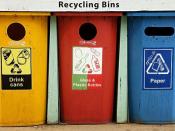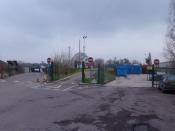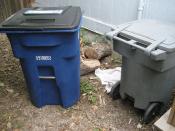Facts: Category Facts: Out of 150,000 citizens in Lakewood, only 45% of the population separates their trash for recycling. The percentage is even lower among those in the middle to lower classes.
Service Issues: The Significant characteristics are that less than 50% of the town separates their trash for recycling.
Competitive Facts: While there is no competition to increase recycling in the community the indirect competition is those 55% of the community who do not recycle.
Audience: Target Audiences: Target audience is two-fold. 1. To target those who already recycle and urge them to continue doing so; 2. To influence those who do not recycle to begin doing so.
Current Mind-set: The 45% who recycle are concerned and therefore do their part to recycle. For those who do not recycle, we cannot assume they do not care but they have not put forth the effort to improve recycling in the community.
Desired Mind-set: The goal is to encourage awareness and to influence them that recycling is positive.
Goals: Business Objectives: The objectives are to increase recycling in the community and to influence that idea as soon as possible.
Role of Public Relations: To use the elements of P.R., in particular, policy formation, communication, and programming in order to increase the need for recycling.
Sources of New Business: The goal is to increase growth in recycling everywhere but to target those areas that have shown the lowest numbers for recycling.
Key Message The key message is to inform all members of the Lakewood Community that recycling is vital to improving life in the community.
Based on the facts provided, our desired audience, our company's goals, and most importantly our key message, we have devised two strategic plans, which we believe will achieve our said goals.
As stated, our company's plan is to increase to the fullest potential recycling in the Lakewood community. We believe that those members of the community who do not recycle are either uneducated about recycling or have not been properly informed of the effects of not recycling. We feel that one of the best ways to make these citizens aware is to incorporate high-ranking public officials from the community to help to promote recycling in the community. By portraying these high-ranking officials as every day citizens, our plan is to show that everyone should care about recycling whether rich or poor. Placing these officials in an environment similar to that of Lakewood citizens will help the public relate to these officials, furthermore decreasing their ignorance on the topic and increasing the desire to recycle.





